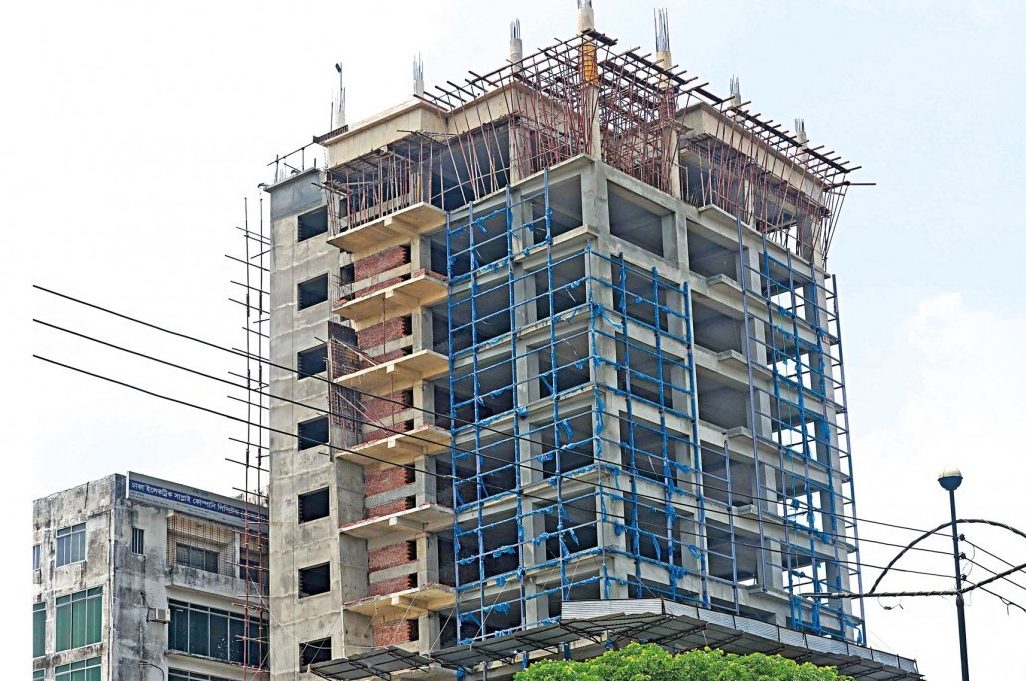Though the government of Bangladesh has taken adequate steps to contain the spread of the deadly virus, its sweeping effects are being felt in almost every sector of Bangladesh.
The global financial crisis has already commenced and the contagion is taking a heavy toll on all the sectors. Some domestic services sectors such as small business, tourism, aviation, hospitality, transportation, ride sharing, retail, food and beverages are showing the impacts of the crisis, as unemployment has hit them hard.
The housing sector of Bangladesh had a promising future, which has been backpedalled due to the outbreak.
The sector contributes around 7.8 per cent of Bangladesh’s gross domestic product, as it is connected with many other sectors and employs several million people. The huge sector meets one of the basic needs — housing, a roof over the head.
It is a composition of several industries, like almost 2,000 developers, construction related industries, housing finance provider companies, land property related entities and a huge contractual and day labour market. The pandemic put a bridle on these vast activities.
The 450 product-based sub-sectors of housing and construction industries and numerous entrepreneurs who have invested in this sector are in a distress now.
When everyone is somehow affected by the epidemic and most of them are struggling to get back on their feet, then the highly expensive industry like housing remained unnoticed.
Since the emergence of the coronavirus, the sales of land, plot and flat of both residential and commercial categories have come to a close, causing a high deceleration of investment in the sector.
According to the Real Estate and Housing Association of Bangladesh, there are almost 200 housing and construction related industries on cast materials, sanitary, electrical and furniture products, which have 458 sub-sectors. The coronavirus has left direct impact on the six million employees of these sub-sectors.
The effect of Covid-19 is devastating in a growing economy like Bangladesh, which is habituated to run with budget deficiencies.
Although the housing sector is there to meet one of the basic needs, the demand of proper housing facility is still very high. The main claimer for affordable housing is the lower and lower-middle income group.
Different entities are involved in the housing sector. There are developers such as land developers who sell plots and building developers who construct and sell apartment. There are state-owned and private housing construction finance companies, who provide loans for construction, purchase and development of both residential and commercial building or apartment. The thing is none of the entities are verily interested to provide the low-income group with the housing facility.
As the only state-owned specialised housing loan provider, Bangladesh House Building Finance Corporation (BHBFC) has tried to provide home loan to lower and lower-middle income group, as it offers a convenient interest rate. It has even brought the upazila sadar areas under its home loan coverage whereas other state-owned home loan providers such as banks rarely go up to the district levels.
Private home loan providers focus on Dhaka and Chattogram metropolitan areas only. Following suit of private home loan providers, developers also concentrate more on the big cities and try to avoid the lower income groups.
The housing sector has already been dealing with some challenges due to the gradual rise in demand and price of land, complications in property documentation, immutable regulatory authorities, the increasing gap between demand and supply of proper housing and widespread urbanisation. Covid-19 just made the situation worse.
Home loan is recently considered as a gratifyingly profitable sector to invest. Many banks and financial institutions are stretching their investment here.
Housing finance system of Bangladesh has dense and lingering repercussions as the cash-flows have dried up. Vulnerability in the mortgage market is getting higher due to payment defaults. Unemployment and reduced income are creating pressure on the borrowers to turn up as defaulters. The tenants are failing to pay the rents properly and many household units are getting vacant, hurting the landlords who may have home loan instalments to clear. The landlords are defaulting also.
Although some options are there to solve the problems such as an increase in repayment period, refinancing facilities and financial packages of the government, how many affected borrower have gotten the benefit?
Because of a fall in income, the homeowners had to get rid of the employees who have been working for their housing maintenance and security. Most of them don’t have any other ways but to leave the big cities and returning to their villages. Most of them have become jobless. The lack of necessary workforce and building materials have delayed many building projects.
As the resumption of economic activities is taking place, the housing finance policymakers such as the government, central bank and home loan provider entities should get ready for it by taking apposite measures and policies to help the economy to bounce back.
First of all, a proper plan should be taken and efforts should be given on its accurate implementation. Some funding is necessary for mortgage securities, affordable housing and overall infrastructural development. To reduce the effect on lower and lower-middle income group and keep the housing finance market functioning, housing finance authorities must have prioritised the benefit of end-users i.e. borrowers and tenants as they are the direct victim of this crisis.
Forbearance initiatives which include temporary suspension of both principal and interest credit repayments will be a great help for borrowers.
The global coronavirus pandemic has put its claws on the economy of developing countries like Bangladesh in a perilous way. To recover from the crisis, the policymakers must ponder the measures positively to boost the promising housing sector and its backlinks.
https://www.thedailystar.net/business/news/housing-finance-another-victim-covid-19-1962041
Rahman is a deputy general manager of Bangladesh House Building Finance Corporation while Shahriar is a senior officer of the organisation.
